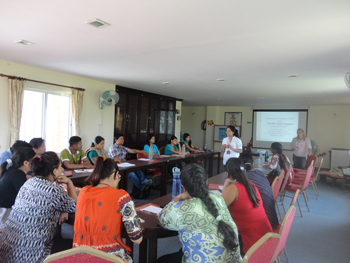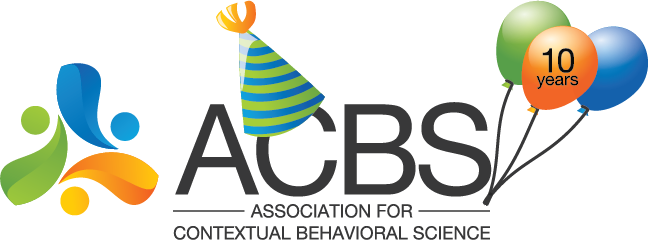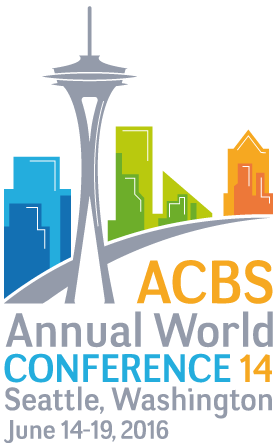2015
20152015 #1 Newsletter (February)
2015 #1 Newsletter (February)|
ACBS Newsletter - February 2015
|
||
ACBS World Conference 13 in Berlin registration now open!
|
||
BBC Interview with Nic HooperACBS researcher and blogger Nic Hooper appears on BBC Radio Bristol with Phil Hammond. Dr. Hammond is a general practitioner who has written or presented several medical problems for the BBC including “Trust Me, I'm a Doctor” on BBC Two where he highlighted medical disparity in the national health service. Our own Nic Hooper appears on a recent episode of Phil Hammond's radio program where he is joined by folk singer Norma Waters. The interaction between the three provides a great context for introducing ACT to a more general audience. Other topics discussed include the CBS approach to suffering, the differences between traditional CBT and ACT, and the various applications of ACT both in terms of clinical presentations and modality of treatment. Click here to listen to the interview, Nic Hooper comes on at the 1:07 mark. Listen soon as the episode is only available until February 15th. You can also visit Nic's blog here for more discussion of CBS topics written for a broad audience. . |
||
Q&A with Jill Stoddard and Niloofar Afari authors of The Big Book of ACT MetaphorsIn this Q&A Jill Stoddard and Niloofar Afari discuss their new Big Book of ACT Metaphors: A Practitioner’s Guide to Experiential Exercises and Metaphors in Acceptance and Commitment Therapy. In particular they talk about the utility of metaphors within the ACT model, give examples of metaphors and exercises which target different processes, and briefly discuss how clinicians can build their own powerful metaphors in session. “In contrast to some other therapies, ACT focuses not on changing the content of internal experiences (i.e., thoughts and feelings) but rather on one’s relationship to them. Changing that relationship cannot be accomplished by using the very cognitive processes that resulted in psychological inflexibility in the first place. ... Metaphors and exercises, while comprised of language, are not critical, rigid, or literal; they are subtle stories that listeners can connect to their personal experiences to achieve a better understanding of the self.” Click here for the full Q&A. |
||
JCBS article examines the utility of ACT processes in improving children's healthy food choice
|
||
Chronic Pain in Maine: An integrated approachA recent article from Maine’s NPR news source highlights a new ACT-based chronic pain treatment group that was designed and developed by Stephen Hull, MD, long-term pain specialist and physiatrist on the pain unit at Mercy Hospital in Portland, Maine. He has been interested in ACT for some time and currently President of the Pain Sig. The program was designed with multiple purposes in mind including to encourage a more behavioral and psychosocial approach to pain. Steve is current on the science of medical pain treatment and is well aware of the concerning data about long-term use of opioid pain medications, their poor record of effectiveness for chronic pain, and risks for both chemical dependency and hyperalgesia. Thus, the program was designed, in part, to permit a "soft landing" for patients tapering off of pain medications and to give them a set of tools for coping and support as they pursued another path forward. The groups, which were presented in detail at last year’s ACBS conference, focus on the ACT Matrix, differentiating hurt vs. harm, education about chronic pain, coping both with pain and lots of other comorbid and related conditions. Unique to this program are several adaptations of the ACT Matrix including a values card sorting task and relapse preparedness using the Matrix to envision what a return to previous patterns of coping might look like and then rehearse how to respond by Noticing and responding more from values and using the Toward moves and effective coping they have learned. The NPR article does a wonderful job of illustrating the journey many chronic pain patients follow before they end up being referred to behavioral treatment. Click here to read the full article and if you have an aligned interest in the domain, click here to join the Pain Special Interest Group. |
||
|
2015 #2 Newsletter (August)
2015 #2 Newsletter (August)|
ACBS Newsletter - August 2015
|
|||
World Conference 13 in Berlin is the biggest yet!
|
|||
Help with the creation of ACT mobile appsResearchers are looking for help from the ACBS community to create a guide for using ACT mobile apps in clinical work and for developing new apps. Drs. Michael Levin and Michael Twohig at Utah State University are asking ACBS members to complete an online survey of their uses, preferences, barriers and needs when it comes to ACT apps.
There has been a recent proliferation of mental health apps, including several ACT apps. With this comes a need to better understand what practitioners look for in an ACT app and what challenges they might encounter. “We are looking forward to sharing what we find with ACBS members” says Levin. “This survey will help characterize current uses of ACT mobile apps, barriers to overcome, and preferred features to guide future app development.” These results will also inform a set of app rating criteria, which will be used to create reviews of ACT mobile apps available in the marketplace. “With all of the apps out there, we want to create more of a review guide to help practitioners pick the right apps for their clients’ needs and goals” said Levin. Give your input on ACT mobile apps by taking the survey using the link below: |
|||
Q&A with J.T. BlackledgeIn this interview, J. T. Blackledge discusses defusion and its role in modern psychotherapy. He starts by providing a clear definition with functional implications, in part he says “Defusion, then, basically involves learning how to not take those misleading, problematic thoughts so seriously—to experience them simply as words, not binding realities.” Blackledge goes on to describe some common difficulties clinicians face when using defusion. He also provides examples of ways to integrate defusion techniques when working with clients on the acceptance of aversive private experiences as well as a number of other similarly important topics. To read the full interview click here. |
|||
Supporting the needs of people in the aftermath of the earthquake in Nepal
|
|||
Interview with Steven Hayes about ACT challenges in our local communitiesIn an interview with BeNe, the Dutch-Speaking Chapter of ACBS, Dr. Hayes answers questions about dealing with local treatment guidelines, the state of the evidence base and current research strategies, the relationship between CBT and ACT, the role of the DSM in the context of local healthcare systems, and a number of other questions about adapting ACT to specific local requirements. The interview is well structured and asked a series of in-depth questions about how ACT can be best utilized within specific healthcare settings. Click here to see the interview. |
|||
|
|||
2015 #3 Newsletter (November)
2015 #3 Newsletter (November)|
ACBS Newsletter - November 2015
|
||||
Happy 10th Birthday, ACBS!
|
||||
Perspective taking reduces the Fundamental Attribution Error (FAE)The fundamental attribution error (FAE) refers to the predisposition for people to attribute the behavior of others to dispositional characteristics, rather than situational causes external to the individual. The current study aimed to investigate whether pre-experimental perspective taking (PT) training could reduce the FAE. Participants were randomly assigned to either receive PT training, or to receive no training, before completing a typical attitude attribution task. This task required participants to watch a video clip of an actor reading an essay for or against capital punishment and then to infer the attitude of the actor. Results indicated that participants in the perspective taking condition experienced a significant reduction in the FAE compared to participants in the control condition. To read the published account of the study and learn more about the intervention used visit the ACBS member portal to JCBS here. If you would like to contribute to JCBS please see our updated submission information page. If you would like a better resource to cite JCBS content, see our new JCBS reference sharing page which includes a downloadable Endnote file for all published and in-press JCBS articles. |
||||
Q&A with Dennis Tirch, Ph.D., and Laura Silberstein, Psy.D.In this interview, Dennis Tirch and Laura Silberstein discuss their book, The ACT Practitioner's Guide to the Science of Compassion, co-authored with Benjamin Schoendorff. Dennis and Laura touch on the initial inspirations for the book, particularly around how mindfulness is being integrated into cognitive and behavioral therapies that transcend specific theoretical approaches. The authors go on to describe the role of compassion within the ACT model, and the interrelation between compassion, mindfulness, and acceptance. They also provide examples of how other members of the ACT community are researching and implementing compassion, and offer a discussion on why utilizing compassion in therapy may be theoretically important in ways that cut across specific, formal characteristics of disorders. To read the full interview click here. |
||||
World Conference 13 Powerpoints, Handouts, and Posters!
|
||||
Join us in Seattle for World Conference 14!
|
||||
|
||||
| Connect. Share. Grow. |
See you at the Seattle World Conference! to be held June 14-19, 2016. Go here for more information. |
 |
||


 Given the dramatic trend toward increasing childhood obesity and the subsequent rise in type II diabetes among younger demographics it follows that interventions which impact on the dietary decision making of children are highly important. Additionally the authors note the tendency among children to choose sweet or fatty foods and avoid novel foods which contributes to over 60% of American children do not eat enough fruits, vegetables, beans, and whole grains to satisfy nutritional guidelines, putting them at risk for nutritional deficiencies. An ACT-based intervention was designed which primarily focused on practicing mindfulness, present moment awareness, and defusion in a way that would engage with the 3 to 5 year old children and promote healthy food choice. Additionally, there was an ACT PLUS condition which constituted “the inclusion of an added emphasis on committed action and values via the addition of a reward contingency for eating any amount of the target food/s.” This proved to be necessary in order to increase consumption of low-preference health foods. This investigation suggests future directions in which the effects of removing the reward system are tested, the impact of the ACT alone condition in contributing to effects of the ACT PLUS reward condition are tested, and the role of choice in reinforcer effectiveness. Improving novel food choices in preschool children using acceptance and commitment therapy can be found in Volume3, Issue 4 of JCBS. ACBS members have complete access to JCBS by logging into the website and following
Given the dramatic trend toward increasing childhood obesity and the subsequent rise in type II diabetes among younger demographics it follows that interventions which impact on the dietary decision making of children are highly important. Additionally the authors note the tendency among children to choose sweet or fatty foods and avoid novel foods which contributes to over 60% of American children do not eat enough fruits, vegetables, beans, and whole grains to satisfy nutritional guidelines, putting them at risk for nutritional deficiencies. An ACT-based intervention was designed which primarily focused on practicing mindfulness, present moment awareness, and defusion in a way that would engage with the 3 to 5 year old children and promote healthy food choice. Additionally, there was an ACT PLUS condition which constituted “the inclusion of an added emphasis on committed action and values via the addition of a reward contingency for eating any amount of the target food/s.” This proved to be necessary in order to increase consumption of low-preference health foods. This investigation suggests future directions in which the effects of removing the reward system are tested, the impact of the ACT alone condition in contributing to effects of the ACT PLUS reward condition are tested, and the role of choice in reinforcer effectiveness. Improving novel food choices in preschool children using acceptance and commitment therapy can be found in Volume3, Issue 4 of JCBS. ACBS members have complete access to JCBS by logging into the website and following 

 Chhori Maharjan is a PsyD candidate and is program manager and principle counselor at Ankur Counseling and Training Center. She was the recipient on an ACBS Developing Nation Scholarship which allowed her to attend the World Conference in 2012. In this short piece Maharjan reflects on her recent return to her native Nepal where she worked to support people there in the aftermath of the earthquakes that affected the population there.
Chhori Maharjan is a PsyD candidate and is program manager and principle counselor at Ankur Counseling and Training Center. She was the recipient on an ACBS Developing Nation Scholarship which allowed her to attend the World Conference in 2012. In this short piece Maharjan reflects on her recent return to her native Nepal where she worked to support people there in the aftermath of the earthquakes that affected the population there. 
